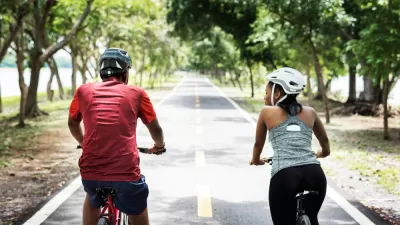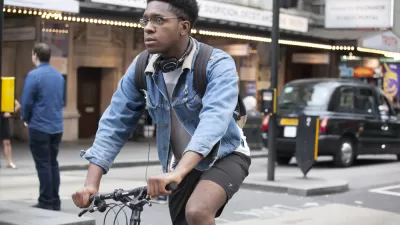A new study by researchers from Harvard University addresses bike equity, which is a powerful tool for increasing access to transportation and reducing inequality in U.S. cities

Ann Lusk writes in The Conversation to describe research she completed with colleagues at Harvard's T.H. Chan School of Public Health:
Many U.S. cities have improved marginalized neighborhoods by investing in grocery stores, schools, health clinics, community centers, libraries and affordable housing. But when it comes to bicycle infrastructure, they often add only the easiest and least safe elements, such as painting sharrows – stencils of bikes and double chevrons – or bike lane markings, and placing them next to curbs or between parked cars and traffic. Cycle tracks – bike lanes separated from traffic by curbs, lines of posts or rows of parked cars – are more common in affluent neighborhoods. Compared with white wealthier neighborhoods, more bicyclists in ethnic-minority neighborhoods receive tickets for unlawful riding or are involved in collisions. With access to properly marked cycle tracks, they would have less reason to ride on the sidewalk or against traffic on the street, and would be less likely to be hit by cars.
FULL STORY: Bike-friendly cities should be designed for everyone, not just for wealthy white cyclists

Planetizen Federal Action Tracker
A weekly monitor of how Trump’s orders and actions are impacting planners and planning in America.

Maui's Vacation Rental Debate Turns Ugly
Verbal attacks, misinformation campaigns and fistfights plague a high-stakes debate to convert thousands of vacation rentals into long-term housing.

San Francisco Suspends Traffic Calming Amidst Record Deaths
Citing “a challenging fiscal landscape,” the city will cease the program on the heels of 42 traffic deaths, including 24 pedestrians.

Amtrak Rolls Out New Orleans to Alabama “Mardi Gras” Train
The new service will operate morning and evening departures between Mobile and New Orleans.

The Subversive Car-Free Guide to Trump's Great American Road Trip
Car-free ways to access Chicagoland’s best tourist attractions.

San Antonio and Austin are Fusing Into one Massive Megaregion
The region spanning the two central Texas cities is growing fast, posing challenges for local infrastructure and water supplies.
Urban Design for Planners 1: Software Tools
This six-course series explores essential urban design concepts using open source software and equips planners with the tools they need to participate fully in the urban design process.
Planning for Universal Design
Learn the tools for implementing Universal Design in planning regulations.
Heyer Gruel & Associates PA
JM Goldson LLC
Custer County Colorado
City of Camden Redevelopment Agency
City of Astoria
Transportation Research & Education Center (TREC) at Portland State University
Jefferson Parish Government
Camden Redevelopment Agency
City of Claremont





























